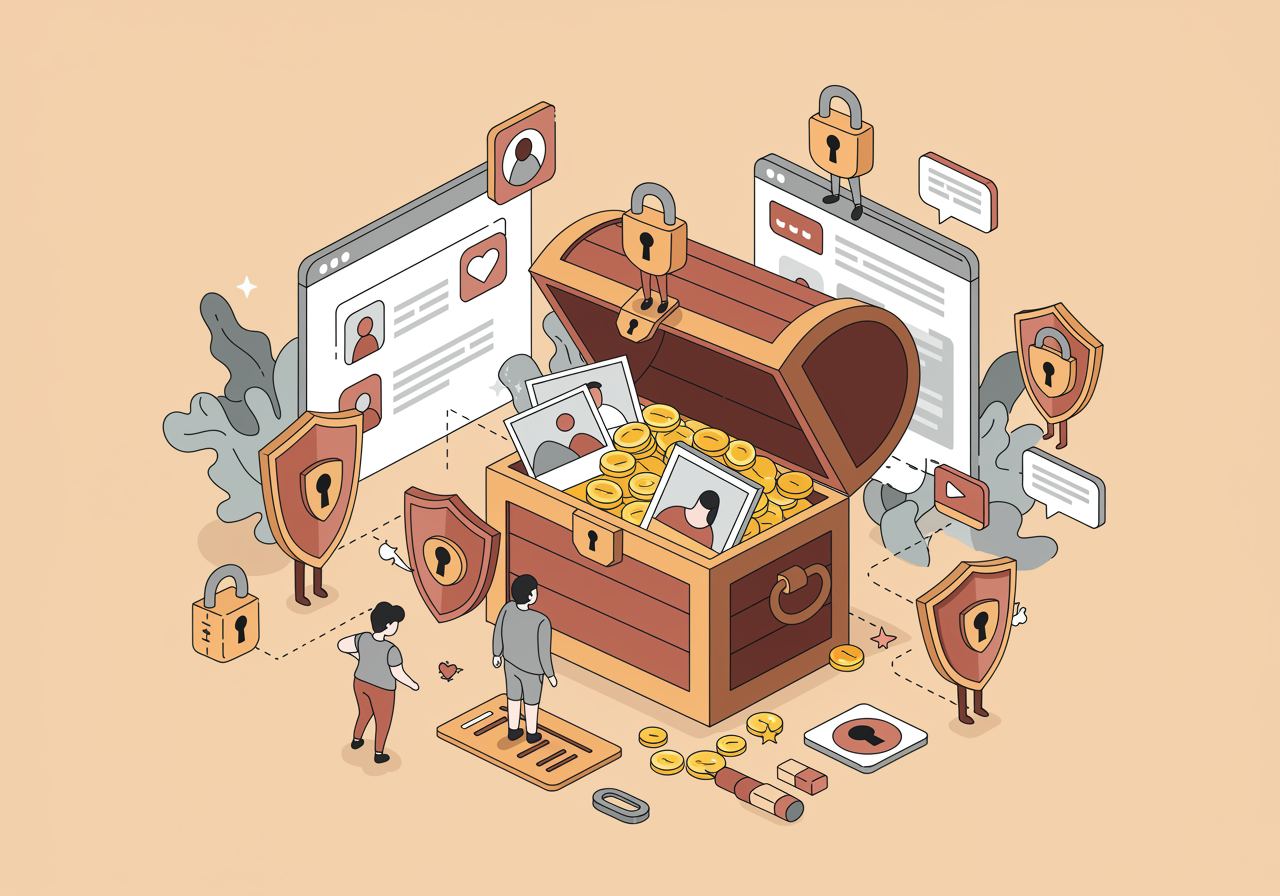Your Digital Treasure Chest: How New Laws Are Changing Online Privacy
Discover why your personal info is like buried treasure and how new rules are helping protect it!
Explore how upcoming online safety laws might transform the way families think about sharing personal information in our connected world.
Overview
Think of your personal information like a treasure chest filled with valuable gems – your name, birthday, photos, location, and even what you like to buy online. Right now, many apps and websites can peek into that treasure chest pretty easily. But new laws are being written that could change everything! These rules might make companies ask permission differently, protect kids' information better, and give families more control over their digital treasures. It's like having better locks on your treasure chest and clearer rules about who gets the key.

Understand in 30 Seconds
Get up to speed quickly
- Personal Info = Digital Treasure: Your name, photos, location, and online habits are like valuable treasures that companies want to collect and use.
- New Laws = Better Protection: Governments are creating stronger rules to protect kids' personal information and give families more control over their data.
- Apps Must Ask Nicely: Future laws might require apps to explain clearly what they want and get real permission before taking your information.
- You Get More Control: These changes could let you and your family decide exactly what to share, when to share it, and who gets to see it.
Real Life Scenario
Situations you can relate to
Imagine you're at a party where everyone is trading baseball cards. Right now, some people can just grab cards from your collection without asking – that's how many apps work today with your personal information. But what if new rules said everyone had to ask permission first, explain why they wanted each card, and let you say no? That's what new online safety laws might do! They could make apps explain in simple words why they want your location, your photos, or your contact list. Instead of long, confusing agreements that nobody reads, you might see clear questions like 'Can we use your location to show you nearby friends?' with easy yes or no buttons. How do you think this would change the way you use your favorite apps?

Role Play
Spark a conversation with “what if” scenarios
What if apps had to introduce themselves like new neighbors?
- Role play: Have your child pretend to be a new app knocking on your 'digital door.' They must explain who they are, what they want (location, photos, contacts), and why they need it – just like a friendly neighbor borrowing sugar!
What if your personal information had bodyguards?
- Role play: Take turns being the 'information bodyguard' who decides which companies can access different pieces of personal data. Practice saying 'That company can know my age, but not my exact location' in different scenarios.
What if you owned a digital treasure shop?
- Role play: Pretend to run a store where personal information is currency. Discuss what 'fair trades' would look like – maybe giving an app your email in exchange for cool features, but keeping your location private.
FAQs
Frequently asked questions people want to know
Will these new laws make my favorite apps stop working?
Most apps will still work great! They'll just need to be more polite about asking for your information and give you clearer choices about what to share.
Does this mean I won't see any ads online anymore?
You'll probably still see ads, but they might be less creepy and personal. Instead of ads that know exactly what you bought last week, you might see more general ads.
Why do companies want my personal information anyway?
Companies use your info to show you things you might like, improve their apps, and sometimes sell that information to other companies. It's like digital currency to them!
Examples in the Wild
See how this works day to day
- California's Age-Appropriate Design Code requires social media platforms to turn on the highest privacy settings by default for users under 18 (California Attorney General's Office)
- The European Union's Digital Services Act forces big tech platforms to assess and reduce risks to minors, including targeted advertising restrictions (European Commission)
- TikTok agreed to pay $5.7 million for illegally collecting personal information from children under 13 without parental consent (Federal Trade Commission)
- Instagram introduced 'Teen Accounts' with automatic privacy protections after pressure from lawmakers about youth safety (Meta Newsroom)
In Summary
What you should know before you start
- New online safety laws are like better rules for a digital playground – they help protect kids' personal information
- Apps and websites might need to ask permission more clearly and give families better control over their data
- Your personal information is valuable, and these laws recognize that kids deserve special protection online
- Changes might include clearer privacy settings, less targeted advertising for minors, and easier ways to delete your information
Pro-tip for Parents
You got this!
If your child seems worried about losing access to their favorite apps, reassure them that these laws are designed to make the internet safer, not less fun. Frame the conversation around empowerment – these changes give your family more control, not less freedom. When discussing privacy, use concrete examples from your child's daily app usage rather than abstract concepts. Ask them to walk you through their privacy settings together – you might both learn something new!

Keep an Eye Out For
Find these examples in everyday life
- News about new social media features designed specifically for teen safety and privacy
- Stories about companies changing their data collection practices for younger users
- Your state or country announcing new digital privacy laws that affect families
- Apps sending notifications about updated terms of service or privacy policies that might be easier to understand
Explore Beyond
Look up these related research topics
- How artificial intelligence uses personal data to make decisions about people
- The difference between digital privacy and digital security – and why both matter
- How different countries around the world approach online privacy and child protection
- The role of digital literacy in helping kids make smart choices about what to share online